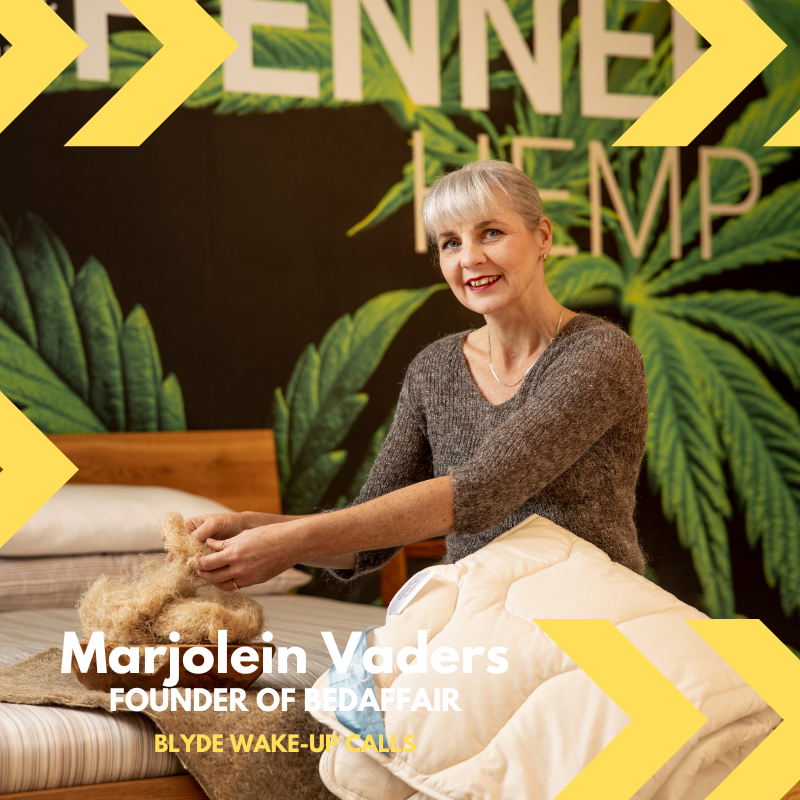BLYDE WAKE-UP CALLS
5 BURNING QUESTIONS TO Marjolein Vaders, co-founder of Bedaffair
The past years have laid bare many truths about our current model of capitalism — the severe income inequality and the belief that human lives and environmental impact are expendable for better profit margins. The changemakers in the growing Certified B Corporation community are demanding an end to the myth that profits must come at the expense of purpose, and environmental and social care. It’s time to wake up, it’s time for action.
As a member of the B-Corp community Blyde believes in the power of the collective, in taking a stand and inspiring people by showing what can and must be changed. In our weekly Wake-Up Calls, we stir up hunger for positive change. We listen to several B Corp voices who talk about their call to action for companies around the globe today. By letting people from different perspectives and businesses speak, we would like to underline the important role of business in this decade of action. ‘On stage’ today: changemaker Marjolein Vaders, co-founder of Bedaffair.
Bedaffair produces sustainable matresses, beds and bedding of natural materials and fabrics to make sleeping more comfortable and fair. What was your wake-up call for contributing to a better world?
Synthetic mattresses are toxic for the environment, our health and support climate change. The core ingredient of these mattresses is polyurethane, a product from the chemical and oil industry. On top of this, synthetic mattresses last only 8 years and can’t be recycled or re-used (or in a difficult way that requires much energy). Sleeping on plastics also keeps you awake at night due to wet and damp spots, which indicates that the mattress is unable to ‘breathe’.
Since 1994 I have developed mattresses made only from organic materials such as organic cotton, organic wool, horse tail hair, flax and hemp. Mattresses and beds which are comfortable, healthy, always dry and cool and locally handmade (bespoke). Bedaffair’s pocketspring mattresses and boxspring beds last up to 40 years, can be repaired, refurbished, all materials can be re-used and in the end all natural materials will compost to enrich the soil. Our natural latex mattresses last up to 12 years, can be fully recycled and all materials can be re-used.
What is your call to action for companies around the globe?
Please produce only if the product is recyclable, re-usable, non-harmful, compostable, etc. Do not produce anything if the value chain is harmful to humans, animals or the environment. Treat everyone in your value chain the way you want to be treated. Check this with your own eyes, visit your production facilities or the workers’ homes or villages for example. If you love yourself, love all humans, animals and the environment too, which helps to gain some empathy for everyone in the value chain.
Which SDG (Sustainable Development Goal) calls you most and why?
Every SDG calls me the most. I am very pleased to make a positive impact on 9 SDGs with Bedaffair. And our hemp products (mattresses, duvets, and comforters) reach even 15 SDGs!
Call me a changemaker – your company in 2030…(biggest dreams, wishes, plans?)
I dream a lot in a very healthy, sustainable, organic, handmade bed which was made about 20 years ago by my husband Arend Vaders. I hope that in 2030, I have inspired people all over the world to sleep healthy and comfortable. To sleep on beds which not only go beyond your comfort and health but will make a change in how we sleep and what we sleep on, as we sleep around 25 years on a piece of furniture which is the most intensive used piece of furniture in our homes. We should be far more aware of the impact of our sleep ánd the mattress we sleep on. During our sleep we can make such a POSITIVE impact. Healthy for the ones sleeping and for our planet at the same time!
If you could invite one company to join the B Corp community, what company would that be and why?
BMW. They are really serious in their effort of producing sustainable cars with sustainable materials. They have only 10% cobalt in their batteries, their cobalt doesn’t come from Congo and BMW is working hard on better working conditions in mining.

Hungry for more wake-up calls? Read the other interviews here!